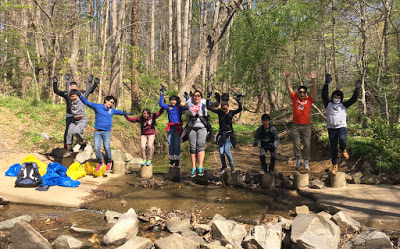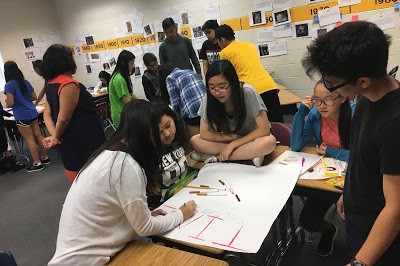Afterschool groups build leadership skills among local Asian-American youths
 |
| AALEAD members work on a stream cleanup project. [Photos: AALEAD] |
Lower-income Asian-American students at Holmes and Poe middle schools and Annandale High School are learning leadership skills and setting goals for academic success through a regional organization called Asian American Youth Leadership Empowerment and Development (AALEAD).
After-school groups in those schools provide a variety of activities aimed at academic enrichment and positive youth development, says Neel Saxena, executive director of AALEAD, which has offices on Little River Turnpike in Annandale, as well as D.C. and Silver Spring, Md.
One out of 10 Asian Americans in Annandale is below the poverty line, Saxena says, and that number has grown by 37 percent over the last five years. Most of the students in AALEAD are eligible for free or reduced-price school lunches.
Eighty percent of Asian American youths in Annandale have parents who were not born in the U.S., he says. Thirty percent of that group have parents with limited English ability and more than 40 percent have parents who have only a high school degree or less.
 |
| Students work on a project at an AALEAD afterschool session. |
The after-school programs meet twice a week. There are about 25 students in AALEAD at each school. AALEAD organizes workshops, guest speakers, experiential learning, community service projects, and field trips.
The students in AALEAD groups are diverse, with families from Bangladesh, Pakistan, India, the Middle East, and other countries. According to Saxena, about 21 percent of the students at Annandale High School are Asian American.
Annandale High School students in the AALEAD group visit their counterparts at Poe and Holmes and help them prepare for the transition to high school. High school students learn how to prepare for college and careers.
Middle school students had a session on cooking, where they brought a dish from their country and talked about how various historical trends, such as colonization, influenced the cuisine.
AALEAD also focuses on identity development, which Saxena defines as “having youth become confident in who they are.” A recent workshop addressed how gender identities are viewed in Asia and the U.S. Other workshops focus on mental health issues, such as bullying, feelings of isolation, and “the unique stress factors that come from dual identity,” Saxena says. For example, Asian American youths often have to serve as translators or cultural interpreters for their parents.
During Asia Pacific Heritage Month, in May, the AALEAD group at Poe had a weeklong program on alleviating stress, covering Western and Eastern methods, such as chanting and yoga.
Asian American kids face unique issues that prevent them from fitting in, Saxena notes. For example, Vietnamese parents with memories of landmines in forests left over from the war might prohibit their kids from going on a camping trip, he notes.
AALEAD gives Asian Americans a voice and opportunities to engage in leadership at their school and in the community. Students take turns leading workshops in their afterschool sessions, where they research an issue and give a presentation.
At Poe, the AALEAD students worked with school administrators to develop and lead a recycling program. Students at Poe and Holmes worked on a project aimed at getting more students to use their school’s running track. They conducted research showing increasing obesity rates among Asian American youths and tied that to the need to promote more physical activity.
AALEAD youths have testified before the Board of Supervisors on the importance of afterschool programs and told their stories at embassies.
A Virginia youth council, with representatives from AALEAD groups at different schools, helps develop the programming for AALEAD workshops and projects. All AALEAD members are invited to a youth summit every fall at a local university with workshops and guest speakers.
AALEAD will a host summer program at Holmes, in which high school students will lead a group of middle-school students in workshops four days a week focusing on issues around identity. It’s important to have these sessions based in a Fairfax County school, Saxena says, so AALEAD students can take advantage of the summer meals program.


Inclusiveness of only certain ethnic groups is clearly discrimination.